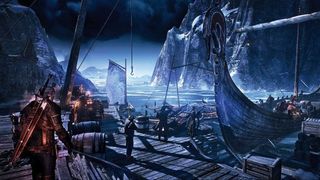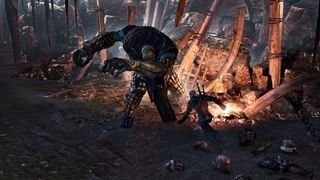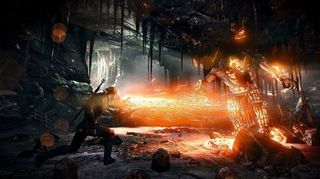The Witcher 3: Wild Hunt first look - slaying giants in CD Projekt RED's icy open world RPG

But Geralt doesn't even need a blade. He holds out a hand and blasts a spray of roaring embers into the nearest man's face. I forgot that he could do magic. The victim reels away with a scream. Geralt follows up with a series of blade strikes, arranging light and heavy blows into a violent morse code of pummelling. Geralt dismantles foes with more flair than ever. The Witcher 3 has 96 motion-captured strike animations, compared with The Witcher 2's 20. It takes just moments to put the man out of his misery.
"Geralt doesn't need a blade. He holds out a hand and blasts a spray of roaring embers into the nearest man's face."
The rest of the group follow, and it's soon time to move on. The demo skips forward to save travel time, transporting us directly to the distant bridge between the rocks. Lukasz spins the camera again so we can see the forest we started in. “You can go everywhere you can see, even here,” Badowski adds with a gesture. At first I assume he's pointing to a fort at the far end of the huge, crescent shaped bay, but I'm wrong. He's indicating the pale outline of an entirely different island. We're in the midst of the Skellige archipelago, which itself makes up only one part of the whole world map. Barring a few especially distant quest instances, the world streams seamlessly, without loading screens.
The bridge serves as the only entrance to a perilously poised castle that clings, limpet-like, to a great spike of rock reaching out of the sea. It's home to the Jarl, a broad, affable bear of a man who greets Geralt on top of the fort's tallest turret. A storm crackles moodily in the distance as Crach explains his dilemma. His hotheaded son – and likely successor to his crown – has ventured out to 'the island from which none return'. He hasn't returned.

Geralt agrees to help, but not before the pair have exchanged a little small talk. They discuss the politics of the Skellige islands with an offhand familiarity that's convincing and informative. Geralt may be terse, but he's not a blank avatar. He knows much about his world that the player doesn't, and isn't afraid to express it. Does this put distance between the world and the player authoring his every move? Perhaps, but Geralt's intelligence grants him a degree of status and autonomy in his world that's more empowering than alienating. His banter is the by-product of a knowledgeable and well-informed mind. It makes Geralt more likeable, and lends credence to the fiction.
"A bustling settlement huddles around the base of the outcrop, far below the battlements of castle Crach"
Pleasantries concluded, Geralt takes a rickety wooden rope elevator down the sheer cliff-face. A bustling settlement huddles around the base of the outcrop, far below the battlements of castle Crach. Fans of The Witcher 2's busy townships won't be disappointed. A muddy thoroughfare holds apart a ramshackle collection of grimy structures. Flickering lanterns appease the gloom of the cliff's shadow and sweary arguments rise above the white noise of the ocean. Dozens of grubby peasants loiter near braziers, gossiping loudly and huddling for warmth.
Geralt strides past the serfs, crooks and drunks lingering in the open and enters an even noisier tavern. There he extracts information on the mysterious island from a boozeaddled navigator. Swaying, the longfaced lunk launches into a story about an adventurer he once knew, but barely manages a sentence before Geralt tells him to shut up and get to the point. Geralt has a knack for saying exactly what I'm thinking.

Then our journey takes a surprising turn. Geralt hops into a boat and sails off into the ocean. You have full control of your vessel. If you choose, you can abandon the main quest and say hello to some other cultures on neighbouring islands, but for the purposes of the demo, we stay on-mission. As the 'island from which none return' looms large, a huge longboat sails past, and I hear the ominous sound of sailors singing a grim sea shanty. Off the bow, a whale surfaces momentarily, then vanishes with a flick of its tail. Once you've discovered a location, you're free to fast-travel there at any time, but the first time round you'll have to discover it for yourself.
Comic deals, prizes and latest news
Sign up to get the best content of the week, and great gaming deals, as picked by the editors.
"A monstrous green humanoid stomps into view, dressed in crude armour made from ropes, planks and bones."
The doomed island is not a cheerful place. Black stone pathways snake inland, strewn with broken bodies. It's a sensible moment to deploy Geralt's 'Witcher sense'. It's a new passive ability – not dissimilar to Batman: Arkham City's detective mode – designed to present Geralt's monster hunting expertise as an environmental overlay. When speared on a splintered tree trunk nearby. “Lifted, and then dropped,” he murmurs. The imagined scene plays out in the environment. A blue spectre appears, is lifted off his feet, struggles against an unseen airborne assailant, and is thrown violently onto the spike. This particular investigation is unfolding as part of a long, involved story mission, but Geralt can use the same technique to hunt monsters the world over. These side missions will be his primary source of income. For the first time in the series, we'll earn a wage doing proper Witcher work.
The culprit in this case isn't hard to find. In a short cutscene, Geralt rounds a corner and spots a gaggle of harpies around the hull of a half-built galleon. Then the earth shakes with slow, sure footsteps. As Geralt takes cover, a monstrous green humanoid stomps into view, dressed in crude armour made from ropes, planks and bones. I don't need Witcher sense to know it's a giant.
Part of the UK team, Tom was with PC Gamer at the very beginning of the website's launch—first as a news writer, and then as online editor until his departure in 2020. His specialties are strategy games, action RPGs, hack ‘n slash games, digital card games… basically anything that he can fit on a hard drive. His final boss form is Deckard Cain.

After playing hundreds of hours of The Witcher 3 since 2015, I can't believe I'd never heard of this mod that squashes 5,400+ bugs and restores cut dialogue

Witcher remake studio boss says it'll remake what's 'bad, outdated, or unnecessarily convoluted' without naming the sex baseball cards we all know he's talking about
Most Popular



